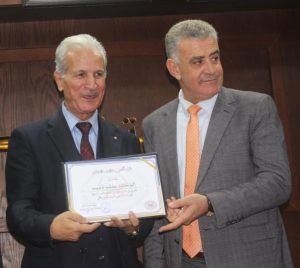Naguib Mahfouz remains undoubtedly a legend in Egyptian and Arab literature and writing, and indeed one of the most globally influential writers, a status he gained after winning the highest literary prize in the world of literature, the Nobel Prize in Literature, which brought him international fame and made him an icon and a reference for Egyptian and Arab writing, becoming the father and dean of contemporary Arab novels.
Mahfouz went through many important stages in his literary life, and on the 19th anniversary of his death, we revisit one of the most heated and controversial stages in his career: the novel “Children of the Alley”.
“Children of the Alley” is one of Mahfouz’s most famous and controversial novels, arguably one of the most controversial novels in the entire history of Arabic literature.
By the mid-20th century, Mahfouz had become one of the most important Egyptian and Arab writers, gaining literary fame after a series of realistic novels, most notably the famous Cairo Trilogy: “Palace Walk,” “Palace of Desire,” and “Sugar Street.”
Mahfouz stopped writing after the July 1952 revolution, feeling that the revolution was addressing the issues he had criticized during the monarchy era, so he paused for five years until he wrote one of his most famous and controversial novels, “Children of the Alley.”
He wrote the novel relying heavily on symbolism, marking a significant shift in his writing style, where the alley symbolized the world and humanity. He tried to address universal issues that preoccupied his thoughts at the time, including the struggle between good and evil. The novel also presented a critical political and social perspective on the situation in Egypt.
The novel sparked controversy from its initial publication as serialized episodes in Al-Ahram newspaper, attacked by extremists, Al-Azhar, and intellectuals alike. Mahfouz was accused of atheism because of it.
Mohamed Hassanein Heikal, then editor-in-chief of Al-Ahram, defended the novel and Mahfouz. Mahfouz faced no direct consequences at the time except that the novel was prevented from being published as a book, with Mahfouz’s own consent. The ban was unofficial and based on caution. Mahfouz waited for the novel to be approved but it never was, as the publisher feared submitting it for publication.
The novel was eventually published after a long wait in Beirut, and the Islamic Research Academy issued the first statement banning the novel for fear of its distribution in Egypt.
Mahfouz defended the novel extensively, considering it purely a literary work and not an insult to the divine self. He said all those who attacked it had not read it properly and tried hard to clarify his viewpoint, asserting it was far from prophetic symbolism.
The novel continued to stir controversy, and despite the ban, it was adapted into a radio series by Voice of the Arabs radio station in 1970, directed by Hussein Abu Al-Makarem, scripted by Abdul Rahman Fahmy, starring Samia Ayoub, Abdullah Gheith, Abdul Rahman Abu Zahra, Tawfiq Al-Daqn, Karima Mokhtar, and Mohamed Reda. The radio station obtained Al-Azhar’s approval, and the series was broadcast in full with minor modifications approved by Mahfouz himself.
The crisis around the novel resurfaced in 1988 when Mahfouz won the highest literary award in the world, the Nobel Prize in Literature. Some claimed he won it specifically because of “Children of the Alley,” accusing the novel of attacking prophets and the divine self.
However, reviewing the Nobel Academy’s official citation reveals this claim to be false. While “Children of the Alley” was mentioned, it was alongside other works such as the Cairo Trilogy, “Midaq Alley,” and “Adrift on the Nile,” as well as Mahfouz’s short story collections like “God’s World.”
On October 14, 1994, Mahfouz survived a vile assassination attempt, with the controversy over “Children of the Alley” resurfacing as one of the main reasons behind the attack.
At that time, the controversy over Salman Rushdie’s “The Satanic Verses” had reignited tensions. Mahfouz opposed Ayatollah Khomeini’s famous fatwa calling for Rushdie’s death, which led extremist cleric Omar Abdel-Rahman to issue a fatwa calling for Mahfouz’s death, arguing that if Mahfouz had been killed after “Children of the Alley,” Rushdie would not have dared to attack religion later.
The assassination attempt failed, and the world reacted strongly with messages, visits, and condemnations from around the globe. The police arrested the perpetrators, who received the harshest sentences, including the death penalty.
The battle over “Children of the Alley” provides rich material for understanding one of the most impactful episodes in the life of the Nobel laureate. Mahfouz himself discussed the novel and its crisis in the book “Pages from the Memoirs of Naguib Mahfouz” by the prominent writer and critic Rajae Al-Naqqash, which is considered the author’s personal memoirs.
There is also the book “Children of the Alley: The Biography of the Forbidden Novel” by writer and critic Mohamed Shaeer, which historically and analytically covers all aspects of the novel’s crisis from its inception, through its serialized publication in Al-Ahram, the ensuing controversies, and the assassination attempt.
The book offers a panoramic and compelling picture of the novel, Mahfouz’s ideas within it, detailed accounts of its publication, reception by the press and cultural circles, and the many debates among intellectuals themselves. Mohamed Shaeer’s book is considered an important reference for understanding the nature of the “Children of the Alley” crisis.













Recommended for you
Talib Al-Rifai Chronicles Kuwaiti Art Heritage in "Doukhi.. Tasaseem Al-Saba"
Exhibition City Completes About 80% of Preparations for the Damascus International Fair Launch
Unified Admission Applications Start Tuesday with 640 Students to be Accepted in Medicine
Egypt Post: We Have Over 10 Million Customers in Savings Accounts and Offer Daily, Monthly, and Annual Returns
Al-Jaghbeer: The Industrial Sector Leads Economic Growth
His Highness Sheikh Isa bin Salman bin Hamad Al Khalifa Receives the United States Ambassador to the Kingdom of Bahrain